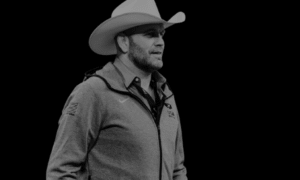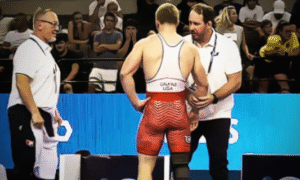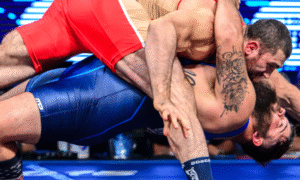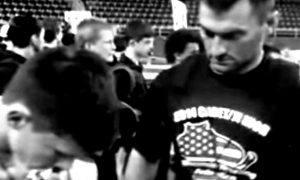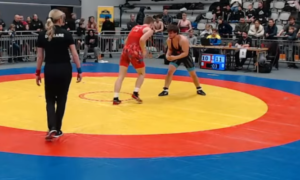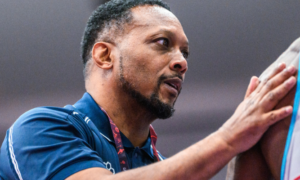“You know what? Okay, I’ll tell you something: I thought about not wrestling Greco anymore.”
The words, they landed with a thud. Here was Peyton Omania (67 kg, NYAC/CYC, 5PM #1), mere weeks after summitting the domestic mountaintop by making the 2021 USA Senior World Team, and he had just confessed to considering the dreaded walk-away. He ended the sentence with “anymore”, but what could that even mean, especially off the lips of a (then) 21-year-old?
“Anymore”, as in not wrestle Greco ever again? “Anymore”, as in not until he felt like it? Who knows? Omania himself didn’t, not back in the spring of 2021 after enduring a devastating loss off the mat that one would only have to assume affected his zeal on it.
When Community Youth Center/De La Salle High School head coach Mark Halvorson passed away last February (this coming Tuesday will be one full year since), Omania instantly struggled in ways he had not previously encountered.
He wasn’t exactly alone. Halvorson was the chief mentor for dozens of Bay Area wrestlers. A coach with an almost unnerving ability to see through nonsense and call it out upon first notice, but always with a hand on the shoulder and a sense of calm. Calm — it is what young men need perhaps more than anything during the most pivotal years of their lives. Someone who is steady like a boulder, who clearly cares more about the individual than match results — but understands how to utilize said results to better shape the human within.
That was Halvorson.
That was Halvorson to current CYC head Stevie Gee, ’16 Olympian Robby Smith, multi-time National Team member Lucas Sheridan (97 kg, Army/WCAP, 5PM #3), and countless others… And that was certainly Halvorson to Omania, but there was one key difference: out of CYC’s most accomplished lot of National-level competitors, Omania was the baby. In a sense, he will forever remain that way, which brings with it a unique sting.
“You see, someone like me, Robby, and Stevie, we eventually reached a next level with Halvorson,” Sheridan explains. “We all got to move through the phase of coach/mentor and athlete to going to bars with Halvorson and having some beers, having some cocktails with dinner. That’s something Peyton didn’t get to experience with Coach. He was the most recent one of us to still be cared for in a father/son way, so he doesn’t know how to comprehend all of this sometimes.”
Omania — a Junior World bronze medalist in ’19 — was in the throes of the collegiate season at Michigan State when he received word regarding his coach. Initially, there was a spotlight moment that, rightfully, many perceived as a byproduct of inspiration. Just days hence, Omania had whammed a pair of headlocks en-route to a lopsided upset victory over Michigan’s Kanen Storr. The win made mainstream wrestling’s news cycle, with numerous outlets touting Omania’s performance and tethering it to what was an obviously hefty emotional component. Further temporal hoopla ensued when Omania qualified for the NCAA Division I National Championships two weeks later.
But inwardly, Omania was in flux. And the outsiders who were fawning over his apparent rebound were missing something.
Linkage
There was barely a breather from February 15, the day Halvorson passed, to early-April. Following Omania’s victory over Storr, he had only a small amount of space to process the unthinkable. The Big Ten Championships loomed on the horizon, the preparation for which offering a slight distraction from the shock and sorrow. Another little gap prior to the NCAA mega-spectacle was availed, too. None of it was enough time. Not really. Not for a young man who was attempting to come to grips with the fact that his primary linkage to both a sport and lifestyle was now gone.
Then it was, ‘Hey, go get ready for the Olympic Trials’.
Michigan State does not have to worry about where Omania’s head is at during the NCAA season. He has proven his commitment to the program and takes his scholastic career sufficiently serious. But folkstyle is not where Omania’s heart resides, nor has it ever, and to pretend otherwise is laughable. The Spartans knew from Day 1 who they were asking to walk through their wrestling room doors. Even when Omania was donning a headgear for Del La Salle High under Halvorson, Greco was the first love. For both of them. The classical style acted as a seemingly unbreakable bond connecting one generation of CYC wrestlers to the next.
Largely because of this, Omania would not have — never in a million years — flirted with missing the Olympic Trials. He had also taken an Olympic redshirt the year prior, but the pandemic washed away that whole deal. Halvorson would have been around to coach him in 2020, and such a realization predictably did nothing other than usher in just a little more sadness for Omania and his crew from Concord. So, he sucked it up and wrestled. He would compete for Halvorson, and for all the shoulders titled in his direction on which to cry.
An opening round loss to fellow ’19 Junior World bronze Alston Nutter (Sunkist/NTS, 5PM #4) kicked off the tournament. It was an entertaining scuffle that saw the pair of superb athletes trade transitions and scores throughout most of their six minutes together. Omania bounced back in the consolation bracket with a victory over Michael Hooker (Army/WCAP, 5PM #4 at 72 kg) before Jamel Johnson cut short a potential path to third place.

Omania (blue) attacks Alston Nutter’s left arm during their high-scoring opening round of the 2020 US Olympic Trials. (Photo: Richard Immel)
One Guy
Two tournaments, really just one, hung on the spring of ’21 calendar after Olympic Team selection: the Senior Nationals, set to begin at the tip end of April; and the U23 World Team Trials scheduled for late May. U23 is what Omania was eyeballing. He had made the Team in ’19 and was shooting for a second consecutive trip to that age group’s World event.
Alas, he couldn’t. Uneasiness persisted. He was drained, in every sense of the word. Now, finally, with an opportunity to gain a fuller grasp of his feelings, Omania wanted a pause. No — he required one.
“After the Olympic Trials, I definitely planned on going to U23’s,” Omania begins. “I was planning to train at home and go out at wrestle. But, I don’t know. My heart really wasn’t in it. It was something about the timing of the U23’s and everything else that didn’t sit well with me.”
One thought led to a cascade of other thoughts. It was not just the U23 Trials that Omania desired to sidestep. Greco-Roman — the discipline and love of his life, fostered by Halvorson and nurtured by his CYC brethren — soon failed to stoke his inner fire. The exuberant nature in which Omania competes and his pleasure for dynamic technical execution had somehow dissipated. And he no longer had the calming, confidence-boosting voice of his “wrestling dad” to steer him back into place.
“I had been coached for tournaments and prepared for tournaments throughout my entire life by one guy, Mark Halvorson,” emphasizes Omania. “In a way, that has almost made me un-coachable. I didn’t want to listen to anyone else, especially during a time like that. I wasn’t sure that I wanted to compete in Greco for a while. I didn’t know how long that would be.”

Halvorson (far right) provides Omania with instructions between periods of the former’s quarterfinal victory over Mohammad Mokhtari (IRI) in the ’19 Junior World Championships. (Image: United World Wrestling)
Support System
Verbalizing the need to ease off the pedal is rarely smooth sailing for a wrestler, at almost any age. Harder still for elite types such as Omania. Most of their entire physiological makeups tick according to competitive cycles. Perhaps there is some fleeting downtime throughout a given year; but even in the midst of sporadic opportunities to rest and reassess, there is pressure. Combined with presumed expectations on the part of others, and it is a topic most athletes would prefer to avoid. They don’t want to disappoint teammates, friends, and family. They sure don’t want to disappoint themselves by coming to a rash decision that might end in regret.
Omania picked the brains of his inner circle. That’s just his way. Excitable, intense, demonstrative, and outgoing — all describe the Spartan’s personality. But there is also a degree of mature vulnerability. He didn’t know much except that he was hurting, and was hoping those around him would understand his thought process.
As it turned out, the responses he received should be plastered inside of a specialized handbook for both parents and coaches.
“The thing that made it easier was that no one fought me about it,” Omania informs, betraying just a tinge of surprise. “Nobody was saying, You should try to do this or that. No one was telling me that I was wrong or anything like that. I think that made me feel a lot more comfortable with my decision, whichever one it was going to be. If I had received negative feedback, I probably would have just went out and wrestled. But my support system understood what I was going through and how I wasn’t getting the results I wanted. It was, Yes, maybe you should take a breather. That support, that love, is what ultimately made me want to do it again.”
It was not a prolonged break that Omania needed.
It was precisely long enough to reach various planes of reconciliation.
All he wanted was a moment. And the thing about moments is that they are not measured in conventional time. Not nanoseconds or milliseconds, not minutes or hours, or days or weeks. Omania himself could not express the length of time that would prove the most useful. He had settled on purposely missing only one Greco-Roman tournament with the caveat that he would not lockdown when he would return to competition. Or even practice, for that matter. Ultimately, the intermission lasted barely over five months.
As the clouds had commenced with their parting, a conversation between Omania and his father gave way to a catalyst for coming back, along with a sense of renewal. “My dad and I had talked. It was, Yeah, take some time off and think about it. Then sure enough, Halvorson probably heard us, and it was Sammy (Jones) calling. ‘When are you going to be back in Michigan?’ he asked me. ‘Maybe we can get some training in because I’m going to be living out here.’ I was like, Well, I guess I don’t really have an option anymore. Sammy and I started training together, and the rest is history.”
Here for a Reason
“I preferred to take my chances by still doing what he would tell me to do.”
Depending on who you ask, 67 kilograms is either the best weight category in United States Greco-Roman, or it shares the honor with 60 or 77. Opinions vary on the order, but 67 is firmly in the discussion.
Was Omania supposed to be a player at the 2021 US Senior World Team Trials? Sure. Why not? That Junior bronze has been nice for some Greco street cred. The same can be said for his placement on other age-group World rosters, his time in the sport, the weapons in his arsenal… No, it was not hard to make a case for him, at least for argument’s sake.
But in a 67-kilo bracket featuring Olympian Alex Sancho (Army/WCAP, 5PM #2), Olympian Jesse Thielke (Army/WCAP, 5PM #5), and two-time National champ Hayden Tuma (Suples, 5PM #3), Omania wore the label of “sleeper”. At 21 years of age, such a distinction presented a suitable fit.
Not long after arriving in Lincoln, Nebraska to do business, everyone learned that, indeed, Omania was wide awake.
Flashing dynamite movement and explosive headlocks and throws, Omania blazed past Tuma and Thielke on the tournament’s first day of action, thus securing a spot in the three-round final opposite Sancho. Their deciding series was tight. It was also a two-match sweep in Omania’s favor. Sancho had not wilted or retreated. They contested exchanges mostly on even footing. But when Omania had to bite down just a little harder, be it for a score or to reset what are often critical positional variances, he did. It was his tournament, his space. Nothing was going to alter the outcome, and another CYC kid was about to try and make his mark on the World stage since Smith’s last run in ’17.

Despite previously unfurling impressive fast-twitch scores earlier in the tournament, Omania had to demonstrate a little more patience against Alex Sancho in order to emerge with the 67-kilogram spot on the ’21 US World Team. (Photo: Sam Janicki)
The question in the beginning was ‘What made the difference for you in this tournament, Peyton? Between your wind, the explosiveness, even your physique, everything seemed improved. What changes did you make?’
So he answers, at first, in “sports guy mode”. He’s savvy to where he can flip that switch with nary an issue. “I realized that I wasn’t in as good of shape as I thought I was,” Omania concedes. “This summer, I got with our weightlifting coach, Kenny Goodrich, and we put together a really good plan for how we wanted to make changes according to how I was feeling, and how I wanted to get better.”
A couple of minutes later, after a touch more detail involving his physical prep for Lincoln, is when Omania decides to relay how he had contemplated an extended hiatus. The prod? Oh, low-hanging fruit: ‘What’s it like thinking about Halvorson now that you’re a Senior World Team member?’ That was it. He didn’t take long to gather words. A pause barely evident before he speaks again.
“It’s good. Obviously, I wish I could call him, but everything happens for a reason. I’m here for a reason.”
That’s what got the wheels spinning. Right there. What compelled his admission to ruminating as to whether or not time away from Greco was a necessity for rediscovering his heart. Omania was correct about all of it, his intuition could not have been clearer or more precise. Except, his heart for the discipline he so loves — and learned to love from a man who gave him infinitely more than a gaggle of techniques and “atta boys” — had never actually left. It was his search for a reason why a break became essential. Once Omania found that, the sky appeared within arm’s reach. From then on, it was as though Greco-Roman was passionately reprogrammed inside of him at an instinctual baseline.
“Everything he taught me was beat into me,” he says, allowing a laugh. “But it definitely feels good to carry on for him.
“Like I said, everything happens for a reason.”
Yeah. He’s proof.

Listen to “5PM50: Mr. Fantastic Benji Peak” on Spreaker.
Listen to “5PM49: Robby Smith on coaching, fatherhood and mentors” on Spreaker.
Listen to “5PM48: Austin Morrow and Gary Mayabb” on Spreaker.
SUBSCRIBE TO THE FIVE POINT MOVE PODCAST
iTunes | Stitcher | Spreaker | Google Play Music





